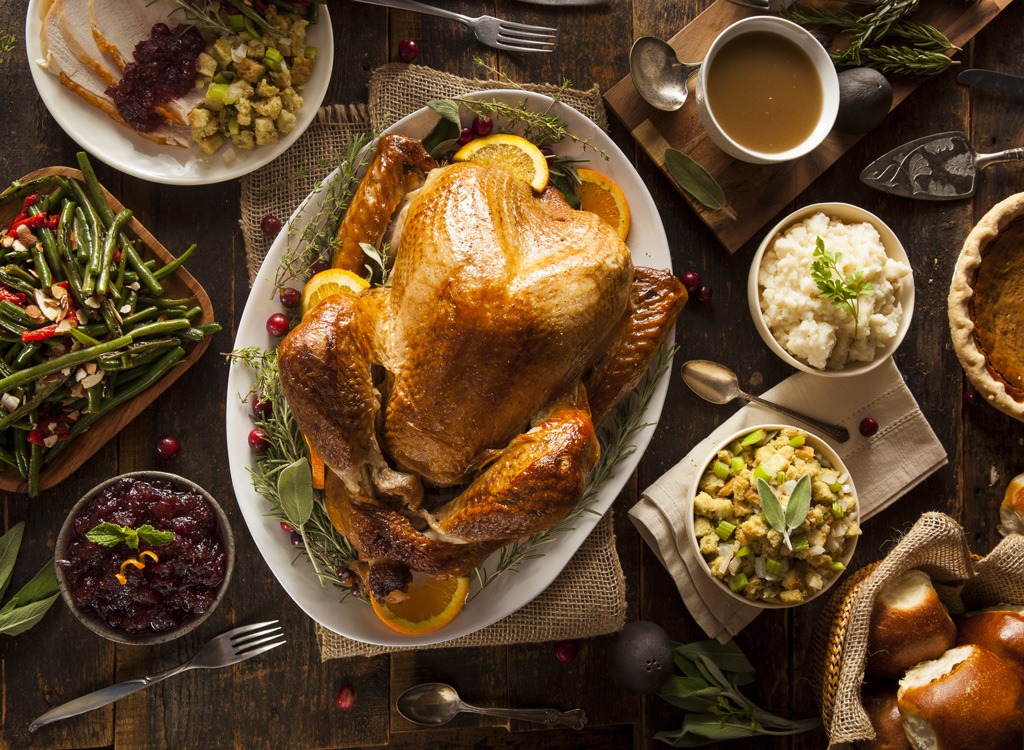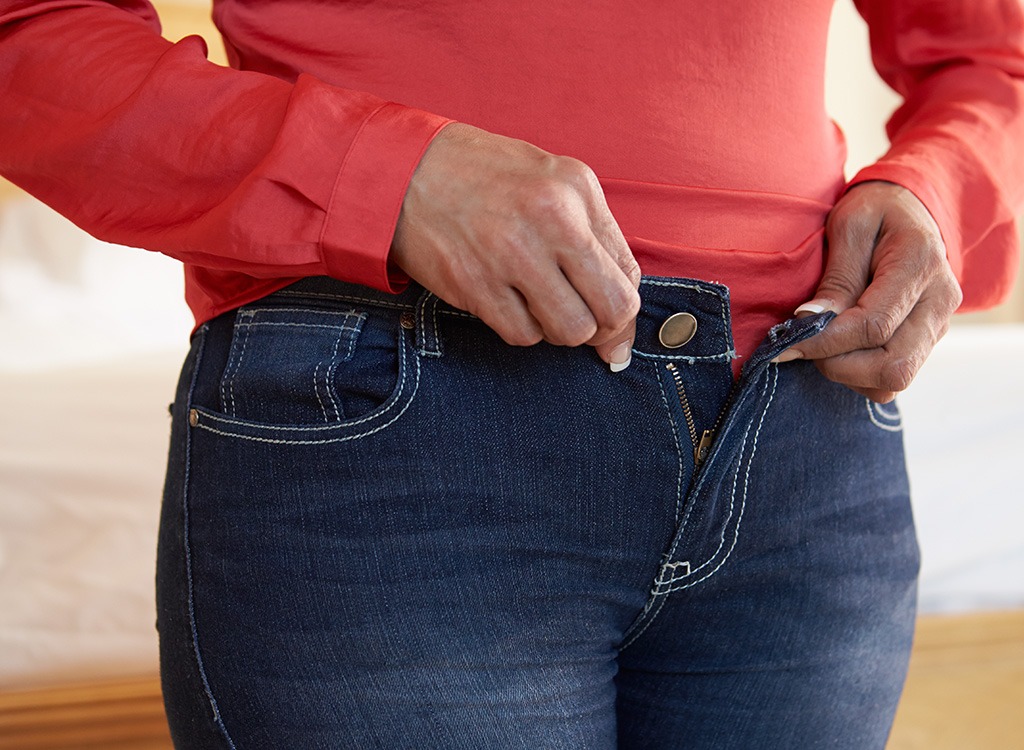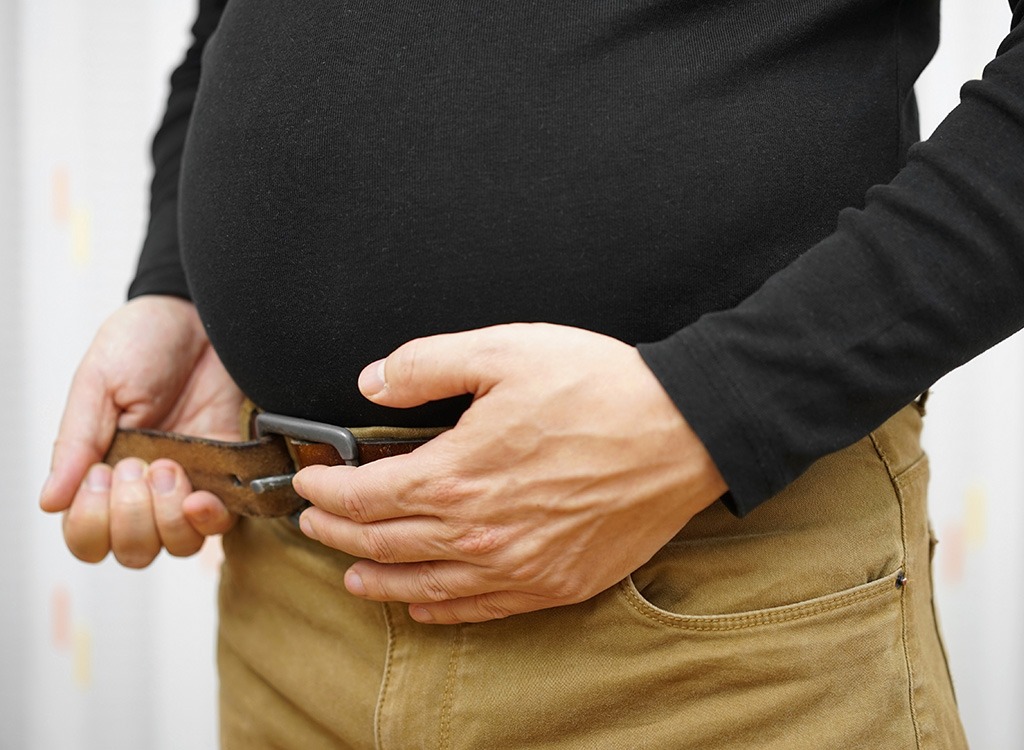What Eating 4,500 Calories Does To Your Body

No Thanksgiving meal would be complete until we're slumped on a sofa, full as a tick and cursing ourselves for not remembering the lesson of Thanksgivings past — to exercise a modicum of restraint.
Depending on our age, size, activity level, metabolism and a slew of other factors, we need between 2,000 and 2,500 calories per day. According to the Calorie Control Council, the average American will consume around twice that — about 4,500 calories — on Thanksgiving. How does the human body deal with the overload? With some degree of difficulty, according to the experts we spoke with. Read to see what happens to the human body when we pack 4,500 calories into it.
You Stress Your Digestive System

"Digestive bomb" is how Miriam Jacobson RD, CDN, describes an influx of 4,500 calories over the course of a few hours. "That's an unnatural amount of food going into the system, and it's ough on the digestive tract," she says. In particular, Jacobson points out that the pancreas and gallbladder are unable to keep up with the amount of enzymes and bile needed to process the extra fat and carbs. "The result is undigested food particles traveling to the large intestine, where they're fermented by gut bacteria, creating uncomfortable bloating." Which leads us to …
There Will Be Gas

Overeating is a good way to ensure that you'll be uncomfortably gassy. This is exacerbated at Thanksgiving, when we're chatting it up at the dinner table with family and friends. Although about 50% of the gas in the digestive system is produced by the gut bacteria mentioned by Jacobson, the rest is actually swallowed air. You do a lot of talking in conjunction with holiday eating. Plus, many people tend to swallow more air when they're nervous. Like when your uncle goes on a politically incorrect rant in front of the person you've brought home to meet the folks. Breathing exercises to reduce stress and anxiety may help reduce excess gas and bloating. Follow up with these Foods That Beat Bloating!
You'll Feel Sleepy, Happy and Flabby

We get energy from food, but consuming more food than we require won't energize us. In fact, it will do quite the opposite. "A turkey-day-sized meal results in a hormone surge necessary for digestion that often leaves us in a sleepy slump," says Jennifer McDaniel MS, RDN, CSSD, LD. She adds a post-meal rise in insulin boosts the hormones serotonin and melatonin, responsible for the drowsiness, but also happiness. But don't worry; that happiness will be offset by remembering that the large surge in insulin you've given yourself, which will promote more carb and fat storage compared to smaller meals.
You Contribute to Organ Damage

With all the fat, sugar from simple cabs, and a couple of alcoholic beverages, your triglycerides can dramatically increase, says Libby Mills MS, RDN, LDN. "Although triglycerides are important for cells to get fat for energy and the fat-soluble vitamins A, D, E, and K, geting too much is associated to the buildup of plaque in the arteries, and inflammation," she says." If triglycerides remain high long-term, damage can occur to the liver, spleen and pancreas."
You'll Stress Your Heart

McDaniel says that a high-calorie, high-fat meal has been shown to harm the function of cells in our blood vessels — even in healthy people — because of those triglycerides. "A high-fat, high carb meal results in a larger number of triglycerides in the blood," she explains. They're a threat to heart health because of the way they can easily enter blood-vessel walls and increase the risk for heart disease. Mills adds that gluttonous eating quadruples the risk of heart attack. Make sure your diet is rich in these Best Foods for Your Heart.
You'll Find Yourself in a Mental Fog

Despite what you may have heard, it's not actually the tryptophan in turkey that makes you foggy and sluggish after thanksgiving dinner. "Eating signals the parasympathetic or 'rest-and-digest' nervous system," explains Jacobson. "[It] redirects blood flow away from your brain and towards your gut — leaving you with, quite literally, a food hangover."
You Could Start Storing Fat for a Week or Two

Eating like someone will take your plate away from you at any moment not only has huge metabolic ramifications, it's also detrimental to your waistline in the medium term. Consuming 4,500 calories in one sitting roughly translates to twice the calories even fairly active men and women require. "The dramatic insulin spike from too many carbs drives the excess calories into fat storage, which can take one or two weeks of clean eating to reverse," warns Jacobson.
You'll Cause an Internal Traffic Jam

"Average-sized meals leave the stomach in several hours, but Thanksgiving dinner sticks around for eight to twelve hours," says Mills. "While you wait, indigestion, flatulence and overall food sedation fills the time." Feeling normal after a massive calorie infusion isn't just a question of waiting for the body to jettison it all. Once the meal passes, there's little relief from the distension, Mills adds. The extra calories from this single meal add up to more than a pound of weight gain. Want to detox and lose weight after the holidays? Try our new bestselling 7-Day Flat-Belly Tea Cleanse! Test participants lost up to four inches from their waists!








